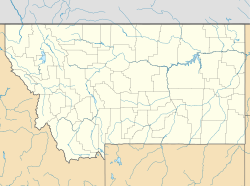
Frederick Theodore Frelinghuysen was an American lawyer and politician from New Jersey who served as a U.S. Senator and later as United States Secretary of State under President Chester A. Arthur.
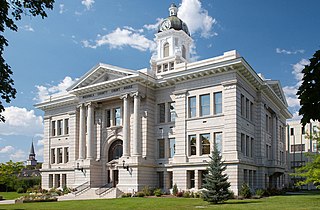
Missoula County is a county located in the State of Montana. As of the 2020 census, the population was 117,922, making it Montana's third most populous county. Its county seat and most populous city is Missoula. The county was founded in 1860. Missoula County comprises the Missoula, MT Metropolitan Statistical Area, and is not a consolidated city-county.

Carbon County is a county located in the U.S. state of Montana. As of the 2020 census, the population was 10,473. Its county seat is Red Lodge.
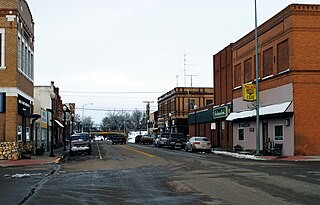
Wibaux is a town in and the county seat of Wibaux County, Montana, United States. It is the only incorporated town in Wibaux County. The population was 462 at the 2020 census.

John Lothrop Motley was an American author and diplomat. As a popular historian, he is best known for his works on the Netherlands, the three volume work The Rise of the Dutch Republic and four volume History of the United Netherlands. As United States Minister to Austria in the service of the Abraham Lincoln administration, Motley helped to prevent European intervention on the side of the Confederates in the American Civil War. He later served as Minister to the United Kingdom during the Ulysses S. Grant administration.
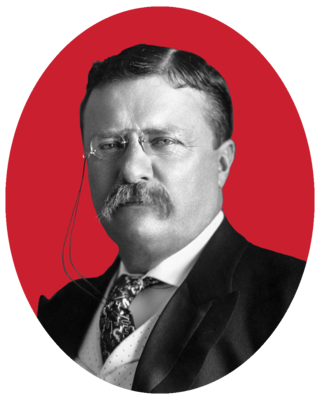
The 1904 Republican National Convention was held in the Chicago Coliseum, Chicago, Cook County, Illinois, on June 21 to June 23, 1904.

The Boone and Crockett Club is an American nonprofit organization that advocates fair chase hunting in support of habitat conservation. The club is North America's oldest wildlife and habitat conservation organization, founded in the United States in 1887 by Theodore Roosevelt and George Bird Grinnell. The club was named in honor of hunter-heroes of the day, Daniel Boone and Davy Crockett, whom the club's founders viewed as pioneering men who hunted extensively while opening the American frontier, but realized the consequences of overharvesting game. In addition to authoring a famous "fair chase" statement of hunter ethics, the club worked for the expansion and protection of Yellowstone National Park and the establishment of American conservation in general. The club and its members were also responsible for the elimination of commercial market hunting, creation of the National Park and National Forest Services, National Wildlife Refuge system, wildlife reserves, and funding for conservation, all under the umbrella of what is known today as the North American Model of Wildlife Conservation.

The Progressive Party, popularly nicknamed the Bull Moose Party, was a third party in the United States formed in 1912 by former president Theodore Roosevelt after he lost the presidential nomination of the Republican Party to his former protégé turned rival, incumbent president William Howard Taft. The new party was known for taking advanced positions on progressive reforms and attracting leading national reformers. The party was also ideologically deeply connected with America's radical-liberal tradition. After the party's defeat in the 1912 United States presidential election, it went into rapid decline in elections until 1918, disappearing by 1920. The "Bull Moose" nickname originated when Roosevelt boasted that he felt "strong as a bull moose" after losing the Republican nomination in June 1912 at the Chicago convention.

George Van Ness Lothrop was a politician in the U.S. state of Michigan, serving as the seventh Michigan Attorney General from 1848 until 1851 and US ambassador to Russia.

Westfield Wheaton, formerly known as Wheaton Plaza, is a 1.7 million square-foot, two-level indoor shopping mall in Wheaton, Maryland, north of Washington, D.C. It is owned by Unibail-Rodamco-Westfield and Its anchor stores include Macy’s, Target, JCPenney, Dick's Sporting Goods, and Costco.
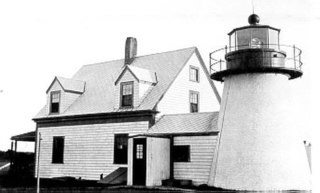
The Hyannis Rear Range Light, also known as the Hyannis Harbor Light, was a lighthouse and, for part of its life, one of a pair of range lights adjacent to Hyannis Harbor. The Range Rear tower was built in 1849 and equipped with a 5th order Fresnel lens in 1856. In 1863 the original birdcage lantern was replaced with a new cast iron one. In 1885, a front range light was added on the Old Colony Railroad Wharf, and the two lights together served to leading vessels to the wharf. The 20 foot Range Rear tower is shorter than most lighthouses, as its purpose was just to guide ships to the wharf. In the early 1800s, the railroad extended from its current terminus at the Hyannis Transportation Center, down what is now Old Colony Road to Harbor Road, where it ended in the 300 foot wharf that was a busy area for shipping coal, lumber, grain and fish.

John Theodore Koehler was United States Assistant Secretary of the Navy from 1949 to 1951.

Theodore Lothrop Stoddard was an American historian, journalist, political scientist and white supremacist. Stoddard wrote several books which advocated eugenics, white supremacy, Nordicism, and scientific racism, including The Rising Tide of Color Against White World-Supremacy (1920). He advocated a racial hierarchy which he believed needed to be preserved through anti-miscegenation laws. Stoddard's books were once widely read both inside and outside the United States.

The 1904 United States presidential election in Montana took place on November 8, 1904, as part of the 1904 United States presidential election. Voters chose three representatives, or electors to the Electoral College, who voted for president and vice president.

The 1912 United States presidential election in Montana took place on November 5, 1912 as part of the 1912 United States presidential election. Voters chose four representatives, or electors to the Electoral College, who voted for president and vice president.

The 1916 United States presidential election in Montana took place on November 7, 1916 as a part of the 1916 United States presidential election. Voters chose four representatives, or electors to the Electoral College, who voted for president and vice president.
George Theodore Boileau was an American prelate of the Roman Catholic church. He served as coadjutor bishop of the Diocese of Fairbanks in Alaska for seven months from August 1964 to February 1965.

The 83rd Massachusetts General Court, consisting of the Massachusetts Senate and the Massachusetts House of Representatives, met in 1862 during the governorship of John Albion Andrew. John Henry Clifford served as president of the Senate and Alexander Hamilton Bullock served as speaker of the House.
